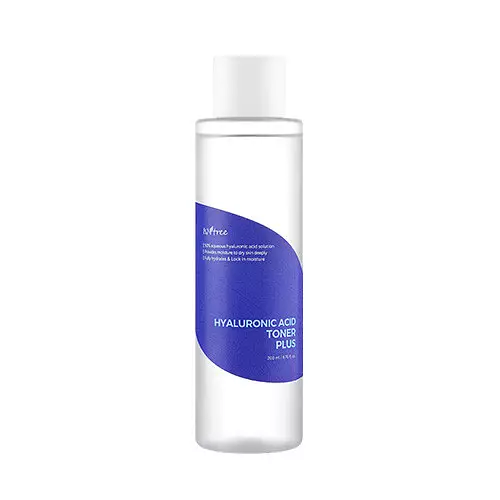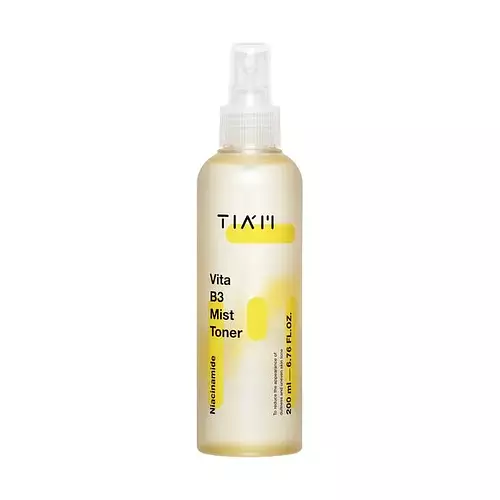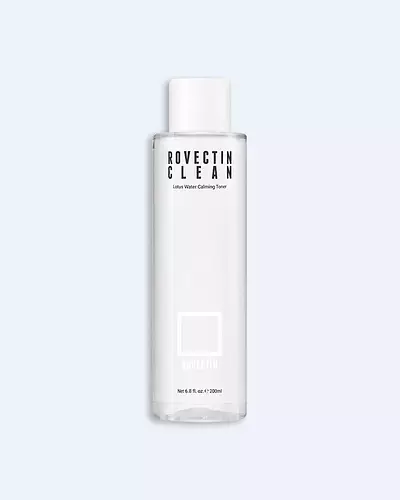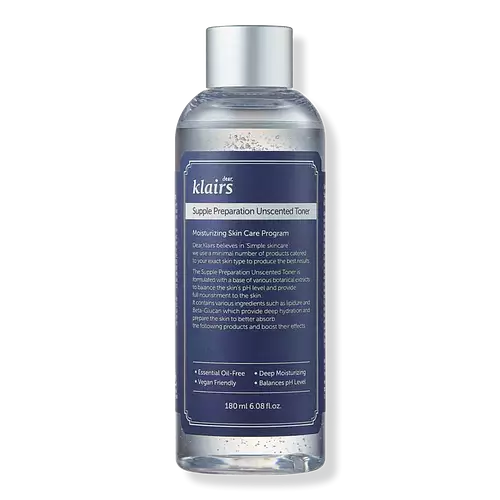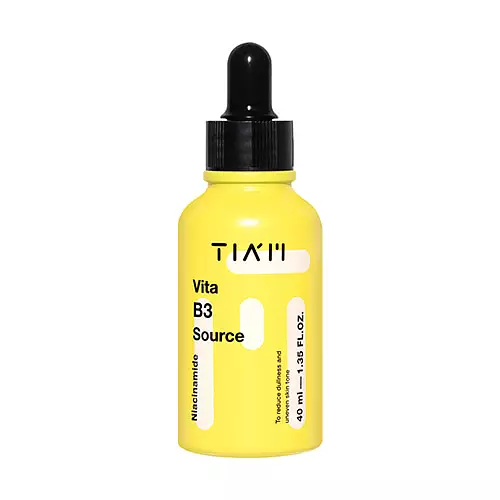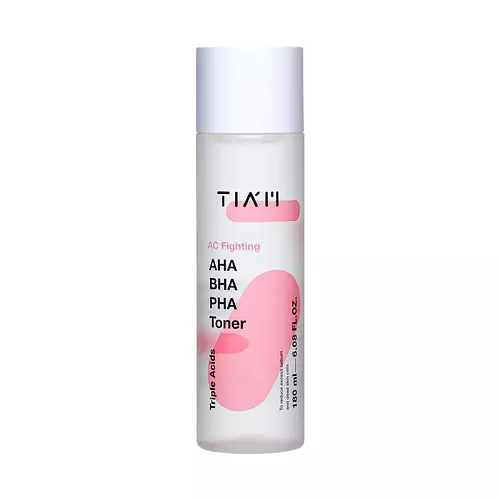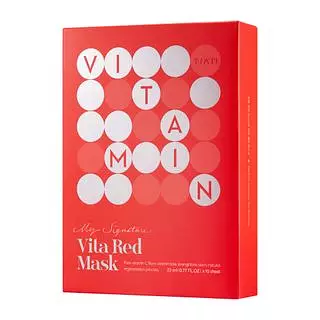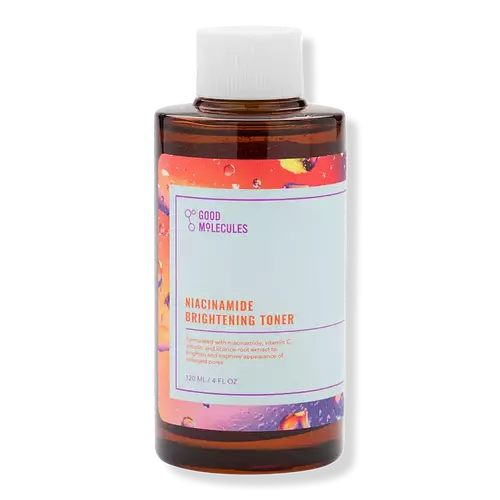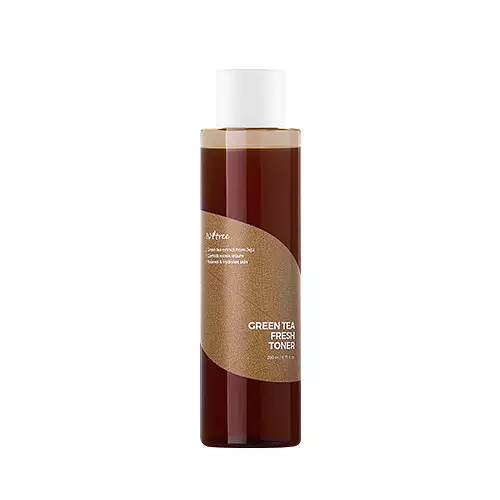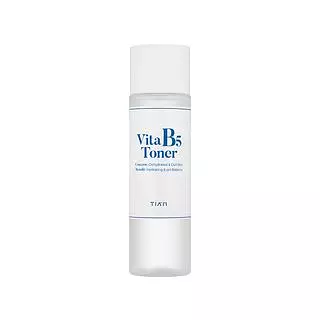
Tia’m My Signature Vita B5 Toner Ingredients Explained
Overview
What it is
Toner with 17 ingredients that contains hyaluronic acid and peptides
Cool Features
It is cruelty-free and reef safe
Suited For
It has ingredients that are good for anti aging, dry skin, brightening skin and sensitive skin
Free From
It doesn't contain any harsh alcohols, common allergens, fragrances, oils, parabens, silicones or sulfates
Fun facts
Tia’m is from South Korea. This product is used in 57 routines created by our community.
We independently verify ingredients and our claims are backed by peer-reviewed research. Does this product need an update? Let us know.
Toner with 17 ingredients that contains hyaluronic acid and peptides
Quick info
You should know
Notable Ingredients
This product contains 1 ingredient that may have this attribute:
This product contains 3 ingredients that may have this attribute:
Benefits
This product contains 1 ingredient that may have this attribute:
This product contains 1 ingredient that may have this attribute:
This product contains 1 ingredient that may have this attribute:
Ingredients 17
Water. It's the most common cosmetic ingredient of all. You'll usually see it at the top of ingredient lists, meaning that it makes up the largest part of the product.
Butylene Glycol (or BG) is used within cosmetic products for a few different reasons:
1,2-Hexanediol is a multi-tasker ingredient. It acts as a preservative to increase shelf-life and can aid other preservatives in preventing microbe growth. 1,2-Hexanediol also helps the skin retain moisture as a humectant.
Panthenol (also referred to as pro-vitamin B5) is a common ingredient that helps hydrate and soothe the skin.
Betaine is a common humectant (a substance that promotes retention of moisture). It's known to be gentle on the skin and can help balance hydration.
Collagen is the most abundant type of structural protein found in your body. In your skin, it is responsible for keeping it firm and youthful.
Glycerin is already naturally found in your skin. It helps moisturize and protect your skin.
You might know this ingredients as Matrixyl. It is a peptide.
Acetyl Hexapeptide-8 is a peptide. A common name for this peptide is Argireline.
Sodium Hyaluronate is hyaluronic acid's salt form. It is commonly derived from the sodium salt of hyaluronic acid.
We don't have a description for Saccharomyces/Imperata Cylindrica Root Ferment Extract.
This ingredient is created by fermenting soybean extract with the bacteria, lactobacillus.
Chlorphenesin is a synthetic preservative. It helps protect a product against bacteria in order to extend shelf life. In most cases, Chlorphenesin is paired with other preservatives such as phenoxyethanol and caprylyl glycol.
Disodium EDTA plays a role in making products more stable by aiding other preservatives.
Citric Acid is an AHA derived from citrus fruits (think oranges, lemons, and limes!).
Water, Butylene Glycol, 1,2-Hexanediol, Panthenol, Betaine, Hydrolyzed Collagen, Glycerin, Oligopeptide-127 Rh-Oligopeptide-1, Palmitoyl Pentapeptide-4, Acetyl Hexapeptide-8, Sodium Hyaluronate, Saccharomyces/Viscum Album Ferment Extract, Saccharomyces/Imperata Cylindrica Root Ferment Extract, Lactobacillus/Soybean Ferment Extract, Chlorphenesin, Disodium EDTA, Citric Acid
Ingredient Ratings
Based on the number of likes and dislikes each ingredient has received.
Ingredients Explained
Water. It's the most common cosmetic ingredient of all. You'll usually see it at the top of ingredient lists, meaning that it makes up the largest part of the product.
So why is it so popular? Water most often acts as a solvent - this means that it helps dissolve other ingredients into the formulation.
You'll also recognize water as that liquid we all need to stay alive. Talk about multi-purpose! If you see this, drink a glass of water. Stay hydrated!
Learn more about WaterButylene Glycol (or BG) is used within cosmetic products for a few different reasons:
- It is a solvent, meaning that it helps to dissolve other ingredients. This also enhances the absorption of the product into one's skin.
- It is a humectant, which means that it helps attract moisture into the skin.
- It helps improve product application.
Overall, Butylene Glycol is a safe and well-rounded ingredient. It is unlikely to irritate skin, and works well with pretty much all other ingredients.
1,2-Hexanediol is a multi-tasker ingredient. It acts as a preservative to increase shelf-life and can aid other preservatives in preventing microbe growth. 1,2-Hexanediol also helps the skin retain moisture as a humectant.
In products that are water-based, this ingredient can help stabilize perfumes and fragrances. It can also help make the texture of products softer and more smooth.
Panthenol (also referred to as pro-vitamin B5) is a common ingredient that helps hydrate and soothe the skin.
lt is a humectant, meaning that it helps the skin attract and retain moisture.
Another benefit is the anti-inflammatory abilities. This means that it's great for sensitive, irritation-prone skin.
Once oxidized, panthenol converts to pantothenic acid. Panthothenic acid is found in all living cells.
Learn more about PanthenolBetaine is a common humectant (a substance that promotes retention of moisture). It's known to be gentle on the skin and can help balance hydration.
Betaine is best for improving hydration and soothing irritated skin. Studies show betaine may help with uneven skin tones.
Betaine is naturally created in the skin and body. The form found within cosmetic products can be either plant-dervied or synthetic.
Learn more about BetaineCollagen is the most abundant type of structural protein found in your body. In your skin, it is responsible for keeping it firm and youthful.
Hydrolyzed Collagen means it has been broken down into smaller particles. This helps the body process hydrolyzed collagen better.
Your body uses collagen for a variety of tasks. These tasks include repairing and maintaning tissues, helping cells communicate, and helping your body’s immune system respond to attacks.
Collagen is comprised mostly of glycine, proline, and hydroxypoline. These are amino acids.
Collagen can be used in the morning or night. It will not increase sun sensitivity, but you should always wear sunscreen during the day.
Learn more about Hydrolyzed CollagenGlycerin is already naturally found in your skin. It helps moisturize and protect your skin.
A study from 2016 found glycerin to be more effective as a humectant than AHAs and hyaluronic acid.
As a humectant, it helps the skin stay hydrated by pulling moisture to your skin. The low molecular weight of glycerin allows it to pull moisture into the deeper layers of your skin.
Hydrated skin improves your skin barrier; Your skin barrier helps protect against irritants and bacteria.
Glycerin has also been found to have antimicrobial and antiviral properties. Due to these properties, glycerin is often used in wound and burn treatments.
In cosmetics, glycerin is usually derived from plants such as soybean or palm. However, it can also be sourced from animals, such as tallow or animal fat.
This ingredient is organic, colorless, odorless, and non-toxic.
Glycerin is the name for this ingredient in American English. British English uses Glycerol/Glycerine.
Learn more about GlycerinOligopeptide-127 Rh-Oligopeptide-1 is a peptide.
You might know this ingredients as Matrixyl. It is a peptide.
Peptides are building blocks for protein. Palmitoyl Pentapeptide-4 consists of five amino acids. These amino acids include: 2 lysines, 2 threonines, and serine
This ingredients tells our body to create more collagen. Collagen is a protein that makes connective tissue. Boosting collagen production leads to a healthier skin barrier. Having a healthy skin barrier means having firm and hydrated skin.
Thus, Matrixyl may help improve the look of wrinkles.
Read more about other common types of peptides here:
Learn more about Palmitoyl Pentapeptide-4Acetyl Hexapeptide-8 is a peptide. A common name for this peptide is Argireline.
Argireline has a similar function to botox. It prevents muscle movement and contractions. By preventing muscles from moving, Argireline also prohibits the formation of fine lines and wrinkles. However, research is lacking in proving this ingredient to be as effective as botox.
Argireline tells our body to create more collagen. Collagen is a protein that makes connective tissue. Boosting collagen production leads to a healthier skin barrier. Having a healthy skin barrier means having firm and hydrated skin.
Read more about other common types of peptides here:
Learn more about Acetyl Hexapeptide-8Sodium Hyaluronate is hyaluronic acid's salt form. It is commonly derived from the sodium salt of hyaluronic acid.
Like hyaluronic acid, it is great at holding water and acts as a humectant. This makes it a great skin hydrating ingredient.
Sodium Hyaluronate is naturally occurring in our bodies and is mostly found in eye fluid and joints.
These are some other common types of Hyaluronic Acid:
Learn more about Sodium HyaluronateWe don't have a description for Saccharomyces/Viscum Album Ferment Extract.
We don't have a description for Saccharomyces/Imperata Cylindrica Root Ferment Extract.
This ingredient is created by fermenting soybean extract with the bacteria, lactobacillus.
Some studies have shown it to have antioxidant properties. One study found this ingredient to have stronger properties than non-fermented soybean extract.
Another study found in increase of isoflavones, amino acids, and peptides in fermented soy milk.
Learn more about Lactobacillus/Soybean Ferment ExtractChlorphenesin is a synthetic preservative. It helps protect a product against bacteria in order to extend shelf life. In most cases, Chlorphenesin is paired with other preservatives such as phenoxyethanol and caprylyl glycol.
Chlorphenesin is a biocide. This means it is able to help fight the microorganisms on our skin. It is also able to fight odor-releasing bacteria.
Chlorphenesin is soluble in both water and glycerin.
Studies show Chlorphenesin is easily absorbed by our skin. You should speak with a skincare professional if you have concerns about using Chlorphenesin.
Learn more about ChlorphenesinDisodium EDTA plays a role in making products more stable by aiding other preservatives.
It is a chelating agent, meaning it neutralizes metal ions that may be found in a product.
Disodium EDTA is a salt of edetic acid and is found to be safe in cosmetic ingredients.
Learn more about Disodium EDTACitric Acid is an AHA derived from citrus fruits (think oranges, lemons, and limes!).
If you spot Citric Acid near the end of an ingredient list, it's likely there as a pH adjuster rather than an active ingredient.
As an AHA, Citric Acid removes the top layer of skin cells from the newer layer of skin underneath. This helps skin to remove dark spots and look more even.
Read more about some other popular AHA's here:
Learn more about Citric AcidReviews
DamDamfino
This is the first specifically hydrating toner I've used, so I don't really have anything to compare it to - but I really like it. It's a good,...
This is the first specifically hydrating toner I've used, so I don't really have anything to compare it to - but I really like it. It's a good, lightweight, quick way to get a burst of hydration and toning that absorbs fast enough to quickly move on to your next skincare step.
It absorbs into dry skin very quickly, the oilier skin not to much.
When my skin feels stripped and over-cleansed, this is very refreshing and calming.
When my skin is irritated and sensitive, this can sting a bit because it has a low pH.
Does it give me glass dewy skin hydration? Not so much. Like I said, it absorbs very fast into dry skin, leaving behind a more of a matte finish than a glossy one.
If used as a face pack soaked on a cotton pad, *then* it can give that ultra punch of hydration dewiness, but it still absorbs and dries very quickly once the face packs are removed.
I mostly use this without a cotton pad, patting it directly onto skin as a refreshing toner in between cleansing and serums.
Compared With
Here are some products that it's often compared with
More Tia’m Products
See all Tia’m productsMore Toners
See all tonersWe're dedicated to providing you with the most up-to-date and science-backed ingredient info out there.
The data we've presented on this page has been verified by a member of the SkinSort Team.
Read more about us




